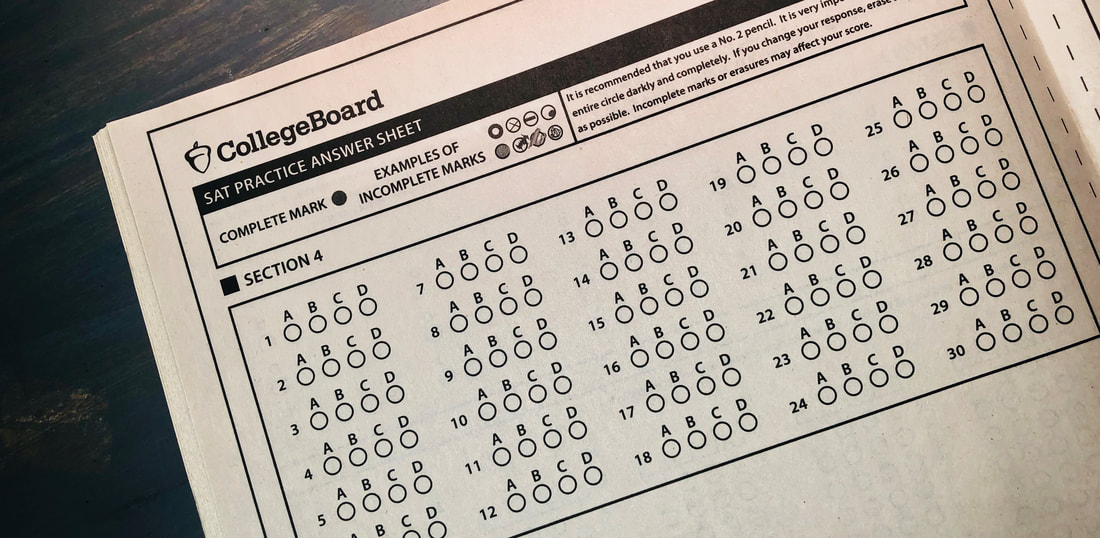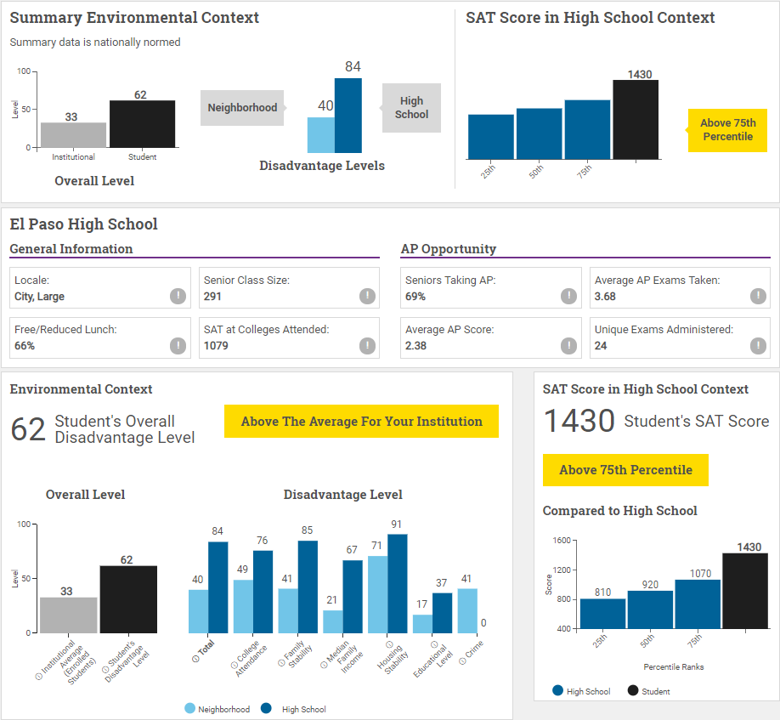|
Many people have asked my opinion on the new "adversity" score that the College Board has rolled out as a way of viewing a student's score "in the context of where they live and learn" (College Board FAQS). Generally, I'm against anything introduced into the admissions process that minimizes true merit, but I wanted to be open-minded. Unfortunately, the more I've learned, the more I am concerned about where this path may lead the, already dysfunctional, admissions process. The "adversity score" otherwise formally known as the Environmental Context Dashboard (ECD) is an attempt to provide "context" for a student's SAT score. The metric takes into account fifteen different factors which fall into three different categories - high school, neighborhood, and the SAT score. High school data such as rigor, performance, and curriculum as well as area information such as crime statistics, property values, and median family income play into this mysterious equation as well. Scores can range between one and one hundred points. Those with scores above fifty are considered to have faced greater than average adversity, so they say. Those with a low score, have apparently faced little adversity. The first concern I have deals with the transparency of the whole process including the way the number is calculated as well as the lack of disclosure of this "score" to the student. While admissions officers can view a student's ECD scores and make judgments about a student's upbringing, effort, and potential just based on those numbers, the student nor the parent is privy to this information should they wish to defend or qualify these rankings. I suspect that this alone may result in some legal challenges for College Board in the future. Second, the "adversity score" is intended to "even the playing field" and attract greater diversity (although race is not a measure). Will students from low crime, middle-class neighborhoods be at a disadvantage because their ECD score reflects (whether accurate or not) a low level of "adversity"? Will a student with a 1360 SAT from a safe, middle-class neighborhood be denied over someone with the same score but a high adversity index score? Will some schools use these numbers to discriminate against students from certain areas as a way of avoiding certain "types"? We will never know for sure. Another issue that the ECD poses is that it limits what defines adverse situations and experiences. I have a client who grew up with two disabled brothers and has overcome her own bone condition. She's from a good neighborhood and school. Would her index have hurt her despite the fact that she's clearly experienced more challenges in life than probably many others in her index area? I have had students experience the death of a parent, suddenly become homeless due to a hurricane, and endure ruthless bullying at school. How do these experiences play into this formula? They don't, and that's a significant problem with the ECD. Also, what about the student whose SAT falls short of an institution's bar of acceptance? The common thought is that if these students have a high adversity score, concessions will be made. Admitting a student whose scores do not align with the expectation of college-readiness is setting that student up for failure. Just because a student has faced challenges in life does not mean that he/she is academically equipped to handle college-level work. In the end, this could result in ill-equipped students struggling in college courses, accruing student loan debt only to drop out. Studies already confirm that low socio-economic status students have a low college completion rate. Lowering standards for acceptance, under any terms, does not seem to be the answer if we are truly interested in educating our future leaders. Another concern I have is that this, inevitably, will become another way that people try to play the system. I know of families who have moved to smaller schools to help improve their child's class rank or athletic recruitment opportunities. It is not all that unlikely that families will attempt to play this system as well, And, does the metric consider how long the student has lived in the area? Did they grow up there or move in last fall? That definitely impacts the level of influence the school and neighborhood has had on a person's "adversity." Finally, and most importantly, I strongly believe in personal privacy and voluntary disclosure. Personal challenges should be something that students can choose to share if they wish. Most college applications have optional questions regarding race, family income, and a several other related personal questions. There is also often a question along the lines of the one here (Apply Texas) where students can voluntarily share about their "adversity": "If there are additional personal challenges, hardships, or opportunities that have shaped or impacted your abilities or academic credentials, which you have not already written about, please note them in the space below." Many disadvantaged applicants want to keep some of these aspects of their lives private. Going away to college allows them to escape that neighborhood or label that may come from their demographics. College offers the hope of a fresh start...or maybe not really. It would bother me to think that some people in a room somewhere drew conclusions about who am I or where I've come from based on the percent of students on free and reduced lunch at my school or the crime in my neighborhood. And, I certainly wouldn't want this type of information to follow me to my university. Will there be a special "flag" on my file to track me? How can I guarantee this type of information remains confidential? I'm glad I am on the other side of college applications these days and not the one applying. Just one more thing that makes students feel out of control in this process.
If the SAT score itself is no longer a reliable measure of a student's likely success at that college, then it should cease to be used as a condition of acceptance or at least not given as much weight. It seems to me that this is likely the reality of the situation and why so many colleges are becoming "test optional." College Board has struggled for years to create a test that truly measures intellect and potential college success while leveling the playing field between those with and those without. I do not think that eliminating all test scores is the answer, but I would love to see more colleges develop a more holistic review process that did not rely so heavily on a test score and allowed more opportunities for students to highlight ways in which they will succeed and be an asset to a college campus. So, if you are a parent of a student in the test-taking years, what do you do? Many are advising students to take the ACT instead. There has been conflicting information reported as to whether the ACT will adopt a similar metric, but based on a blog entry by ACT CEO Marten Roorda, it seems that there are no plans in the works for something similar being implemented with ACT. The uncertainty surrounding how colleges will use the EDC reminds me of 2016 when College Board modified the test and went back to the 1600 scale. There was a learning curve as colleges established their ACT equivalencies and new SAT scores for academic merit scholarships. To avoid the unknown surrounding how the new scores would scale in comparison, many headed to the ACT camp. Students want to feel in control. The test itself causes enough stress as it is without a new unknown. After being initially piloted at 50 schools, 150 more plan to use the score this year. By 2020, it is believed that all colleges will have access to the "adversity" scores. Hopefully by then, we will have more information and many of my concerns will prove unwarranted. Until then, I'm inclined to advise my students to take the ACT instead.
0 Comments
Your comment will be posted after it is approved.
Leave a Reply. |
Author
I am a wife, mom, and educator. I love learning and helping others learn. Few things are more rewarding than helping kids find their way. Archives
December 2021
Categories |
Cassie Friend
College Admissions Consultant
Katy | Houston | Online
College Admissions Consultant
Katy | Houston | Online



 RSS Feed
RSS Feed

